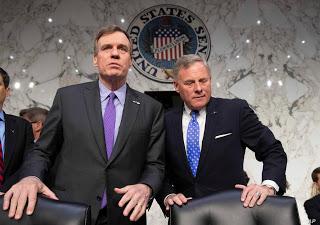
Mark Warner and Richard Burr of Senate Intelligence Committee
Since impeachment proceedings failed to remove him from office, Donald Trump has grown cocky enough to refer to Robert Mueller's Russia investigation as a "hoax." It's likely quite a few of Trump's supporters even buy that line of garbage. But it might be a harder sell now that the U.S. Senate Intelligence Committee has released a bipartisan report that agrees with U.S. intelligence agencies that Russia did, in fact, interfere with the 2016 election -- and did so with the purpose of helping Trump get elected. From a report at USA Today:
The Senate Intelligence Committee reaffirmed its finding that Russia interfered in the 2016 presidential election, backing the conclusions of intelligence agencies and undermining President Donald Trump's often-repeated claim that the investigation into his campaign was a politically motivated hoax.The Republican-led committee on Tuesday released a heavily redacted report saying the intelligence community presented a "coherent and well-constructed" basis for Russia's interference in the 2016 election.
The intelligence community "makes a clear argument that the manner and aggressiveness of the Russian interference was historically unprecedented," according to the 158-page report, one of four the committee has released on the Russia investigation.
The bipartisan report also said that analysts who prepared the intelligence community's assessment of Russian interference "were under no politically-motivated pressure to reach specific conclusions."
Trump has long-sought to undermine the intelligence community's assessment of Russia's interference campaign and has moved to shake-up U.S. leadership at the agencies.
The Senate panel found election interference from foreign adversaries likely will be an ongoing concern:
In the Senate review, Chairman Richard Burr, R-N.C., said the intelligence assessment represented "strong trade-craft, sound analytical reasoning."
“The committee found no reason to dispute the Intelligence Community’s conclusions," Burr said in a statement.
Burr said Russian interference "should be considered the new normal" as agents of the Kremlin have spawned imitators who are increasingly seeking to "sow societal chaos and discord.""With the 2020 presidential election approaching, it’s more important than ever that we remain vigilant against the threat of interference from hostile foreign actors," the chairman said.
What are the implications of the Senate panel's findings? This is from Politico:
Beyond its possible political impact, the report represents a confidence-booster to the country’s intelligence community at a time of great uncertainty.Trump has openly criticized the intelligence community’s work, both as a presidential candidate and as commander in chief. His fury has only intensified since its inspector general alerted Congress last year of a whistle-blower complaint regarding the president’s posture toward Ukraine, a process that resulted in his impeachment.
The president is still rejecting intelligence officials' more recent warnings — delivered to lawmakers last month — that Russia is interfering in this year's election and that Moscow has a preference for Trump. . . .
The latest report from the Senate panel is an open rebuke to the House GOP’s report issued in early 2018, which faulted the intelligence community's assertion that Putin had developed a preference for a Trump victory in 2016. Republicans on the House Intelligence Committee said at the time that this conclusion was the result of “significant intelligence tradecraft failings that undermine confidence in the [assessment’s] judgments regarding Russian President Vladimir Putin's strategic objectives for disrupting the U.S. election.”
But Burr immediately spiked this conclusion, broadly hailing the intelligence community's tradecraft. The new report, too, dismisses the suggestion that the Putin findings were flawed.
